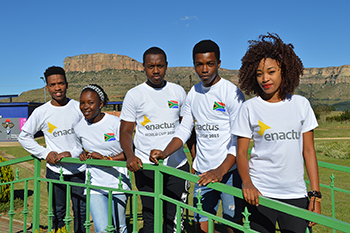Latest News Archive
Please select Category, Year, and then Month to display items
10 March 2022
|
Story Anthony Mthembu
|
Photo Unsplash
 The No Student Hungry team gearing up to start distributing food parcels to the selected students.
The No Student Hungry team gearing up to start distributing food parcels to the selected students.
The UFS is one of the many institutions of higher learning where food insecurity is an active issue. However, the
No Student Hungry Programme is one of the initiatives launched at the university to assist in fighting food insecurity at the institution.
The purpose of the programme
Since its inception in 2011, the initiative has assisted many students in acquiring a healthy meal. Additionally, the Food Environment Office also hands out food packages, so that students can continue to achieve academically. “We are trying to develop a healthy environment for students and make it easier for them to have a nice and healthy meal,” stated Annelize Visagie, who heads the Food Environment Office at the UFS. The Food Environment programme is spread out on all three campuses, each with its own facilitators. Furthermore, the programme mainly caters for students who are not funded by the National Student Financial Aid Scheme (NSFAS) but who are excelling academically. The abovementioned students apply for assistance online, and a list is then drawn up of students who receive assistance for the year.
Alternative solutions to keep the initiative running
On the Bloemfontein Campus, the No Student Hungry Programme will be catering for 200 students in the 2022 academic year, assisting them with a daily nutritious meal. Additional food parcels are also handed out to provide further assistance. “We give food parcels to the students on the list every Tuesday and Thursday at the Thakaneng Bridge,” Visagie highlighted. However, she argues that catering for the student population through this programme can be a challenge, as the demand for assistance is growing rapidly and the ability to assist is limited. The programme relies on partnerships and sponsors to assist the student body. In fact, the coordinators of the programme currently have a memorandum of understanding with Tiger Brands according to which they deliver around 100 food parcels for distribution.
In addition, the coordinators have put in place alternative measures to ensure that they can provide more food to students. “The
Kovsie Act Office, in partnership with the
Department of Sustainable Food Systems and Development, has started a food garden where healthy and nutritious produce are grown, in order to add value to the distribution,” she indicated. Although the programme can only assist to a point, students who are in desperate need of assistance are never turned away. In fact, the
Social Support Unit at Thakaneng Bridge usually assists students with food vouchers for a maximum of four days.
A commitment to teaching healthy eating habits
The programme is not only committed to curbing food insecurity, but also to ensuring that students have a healthy and balanced diet. As such, a booklet is being issued by the
Department of Nutrition and Dietetics in collaboration with the Department of Sustainable Food Systems and Development, which contains ways in which students can make a healthy meal using some of the ingredients offered in the food parcels.
“We want to teach students how to eat healthy in the cheapest way, because they don’t have a lot of money to buy expensive food products,” Visagie argued.
Enactus heeds call to be of service to its communities
2017-01-17

The newly-elected vice president of Enactus
University of the Free State, Solomuzi Khati
(third from left) with members of Enactus on
the Qwaqwa Campus.
Photo: Thabo Kessah
The future of South Africa is in good hands if Enactus activities are anything to go by. Enactus is an international non-profit organisation bringing together student, academic and business leaders committed to using entrepreneurial action to improve lives. And the Qwaqwa Campus chapter is doing exactly that – changing lives.
Community engagement
This team of enthusiastic and energetic students have touched the Qwaqwa community in more ways than one through their community engagement activities. One such activity was when they adopted the Team Spirit Centre as their partner for development and empowerment.
“Up to now, the chapter has lived up to its purpose of assisting and uplifting the Qwaqwa community. As part of our programme, we identified a problem that we are currently helping to solve,” said Solomuzi Khati, the newly-elected vice president of Enactus University of the Free State.
Skills development
“We have realised that many centres housing orphaned and vulnerable children, like the Team Spirit in Makoane in Qwaqwa, are not sustainable. Our project introduced a business concept to the centre where we helped to plant vegetables so the owner Mrs Manthabeleng could then use and sell at a later stage,” he said. “In the process, students and Mrs Manthabeleng would develop various entrepreneurial, finance and business skills for future use on top of the centre generating income to sustain itself,” he added.
Appointment of Advisory Board
Khati also revealed Enactus was in the process of inviting business and community leaders into their Business Advisory Board. “This is a group of business people who are recruited to serve as mentors for our team. Typically, a Business Advisory Board is composed of 10-50 business leaders in the community. Board members can keep students informed of current business concerns and trends, provide financial or in-kind assistance for projects, critique annual reports and presentations, and provide networking opportunities.”